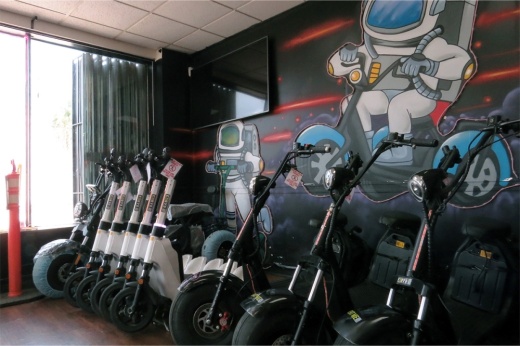Latest update
A coalition of seven Houston e-scooter rental businesses formed after the proposal was introduced in July. The Houston Legal Scooter Coalition includes ERYD, H-Town Scooters, Bolt Scooters, Glyderz, Swerv, iRideHTXScooters and StarRYD.
Abraham Levitz, the coalition’s spokesperson and co-owner of ERYD, said a ban punishes responsible riders and that the city shouldn’t lump all e-scooter users as irresponsible. It would also punish the businesses that rely on the sale or rental of the e-scooter equipment, he said.
“[The ban] could bankrupt our entire business,” Levitz said. “It would be severely and economically devastating, and put hundreds of people out of work. We have major investments in the locations we are in. We have signed leases, we went through the entire permitting process to get this and we have employees that we have here. All that stuff would get threatened.”
According to the coalition, e-scooter rentals from ERYD, Bolt and Glyderz rose from 2021 to 2024, with a total of 86,213 rentals in 2021 rising to 176,740 in 2024.

“[Illegal vendors] would set up in and around the Discovery Green and Downtown area, and they didn’t carry insurance,” Levitz said. “They were renting out consumer-grade products, they were doing it in the public right of way, they weren’t following any of the rules. It’s bringing the wrong element to that part of the city. We would not normally rent to the people they’re renting to, such as minors and people who were inebriated.”
Levitz said the coalition recommends the city look toward several regulatory options to support the city’s public safety goals, including:
- No scooter zones: Primarily around Discovery Green, Avenida Houston and portions of Downtown where there’s high pedestrian traffic or city events that demand restricted use.
- Scooter registration: Permitted scooters must be registered in a centralized database with a unique serial number.
- Technology: Every scooter must include embedded GPS tracking and support geofencing, speed zones and prohibited sidewalk-use alerts.
- Rider eligibility: Every rider must present a valid driver’s license at the time of rental.
- Annual permit fee: Operator will pay an annual fee negotiated with the city.
- Instructional briefing: All riders must receive a short safety orientation and rule overview before each ride.
On the other side
Proponents of the ban, such as Discovery Green President Kathryn Lott, told Community Impact that she and her staff have experienced what she described as “violence issues” after groups of people with e-scooters would overtake the park and lawn.

Levitz said these groups gathering in the Downtown and Discovery Green areas are “all different types of people, not just scooter people,” and he believes the city is dealing with an enforcement issue.
While Lott fully supports the ban, she said she is open to regulations in the future. She believes implementing a ban first will keep people safe and allow city officials and the community more time to figure out what regulations could be in place.
“We need to do something now, right away, cut it off and then go back and nuance the ban,” Lott said. “I want to do anything and everything to ensure the safety of our park-goers. Right now, what I believe is the safest thing is to ban scooters from Downtown altogether. Then as a community work towards figuring out what can be allowed and what can be done.”
The background
In 2021, Houston passed an ordinance that restricted e-scooter businesses and companies from renting equipment in public rights of way—such as sidewalks and streets—and restricted e-scooter use on sidewalks.
Maria Irshad, the deputy director of Administration and Regulatory Affairs, said during a July 24 Quality of Life Committee meeting that the newly proposed ordinance comes from safety issues and complaints arising from scooter use, such as “reckless riders” who go too fast, ride on sidewalks, or ignore stoplights and street signs.
From 2021 to 2024, 53 accidents occurred, with 21 accidents and two fatalities that occurred in 2024, according to previous Community Impact reporting.
“[A ban] gives the city a clean start," Irshad said. "We get our sidewalks back, and then, you know, if the administration directs, then we go back to the drawing board and say, ‘Okay, let’s try and figure this out now.'"
What the experts say
Bruce Race, professor of architecture and director for the Center for Sustainability and Resilience at the University of Houston focusing on e-mobility equity and urban design, told Community Impact that cities throughout the United States are continuing to figure out how to address electronic transportations—such as e-bikes and e-scooters—after years of working on infrastructure designed more for walking and regular biking.
“You’re looking at something that’s complicated and has a lot of moving parts, and a lot of emotion connected to it,” Race said.
Race said there are six regulations cities could consider to reduce injuries, including:
- Requiring riders to wear helmets
- Regulate the speed
- Age limits
- One person per vehicle
- Preventing drunk or high riders from operating
- Whether or not to allow nighttime scooter use, i.e., time restrictions
Julian Ramirez, council member and chair of the Quality of Life Committee, told Community Impact that the city is sorting through all stakeholders’ viewpoints to address the safety issues that “reckless scooter riding” presents.
“There are a number of sides to this issue,” Ramirez said. “You have the folks who live Downtown who are very concerned about their safety. You also have the folks who use scooters to get to work and school as a mode of transportation, an inexpensive one. You have companies that rent scooters for several years and have established businesses.”
Ramirez said he has personally seen firsthand what some parts of Downtown and Discovery Green faced, describing it as an "inundation of a large number of scooters in a relatively small area,” with many of the scooter users driving “recklessly” on sidewalks.
Ramirez suggested the idea of limiting scooter usage to certain times of the day and wants the city to gather data to understand whether the idea could work or not.
Levitz disagreed with implementing nighttime restrictions and said that people use e-scooters outside of commuting to work, such as exploring and traveling.
“There are a lot of reasons why people ride these things into the evening,” Levitz said. “No. 1, it’s very hot. Houston, when it gets into the evenings, it cools down. People like to go out and ride because it’s cooler. No. 2, there’s less traffic. No. 3, the whole reason people come Downtown is because things are open later. If we disenfranchise [scooter usage at night], they’re going to be less compelled to come Downtown.”
One more thing
Mayor John Whitmire wrote in a July 24 social media post that the proposed ban is in response to the “economic and public safety concerns” raised by stakeholders, including Police Chief Noe Diaz, Discovery Green, hotel and restaurants owners, George R. Brown Convention Center attendees, and Theater District customers.
“The majority of individuals using scooters in the area are not Houstonians, but instead came here for joyriding, rather than using them for school or work,” Whitmire wrote. “Many scooter users disregard traffic laws, putting themselves and others at risk.”
The mayor’s chief of communications, Mary Benton, said in an Aug. 12 statement that the administration will continue to take input from the public as the city continues to refine the policy.
“Mayor Whitmire encourages public discourse around major policy issues and appreciates the different ideas expressed by all stakeholders,” Benton wrote.
The proposed ban was first brought up during the July 24 Quality of Life Committee meeting. It’s unknown at the moment when the proposal will be voted on by City Council, Ramirez said.





